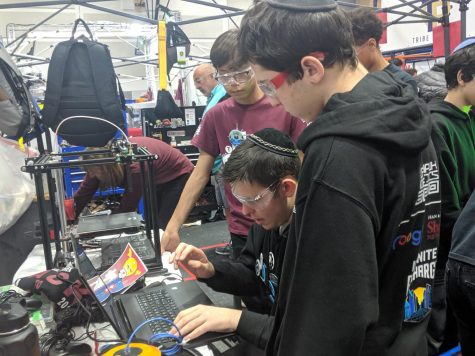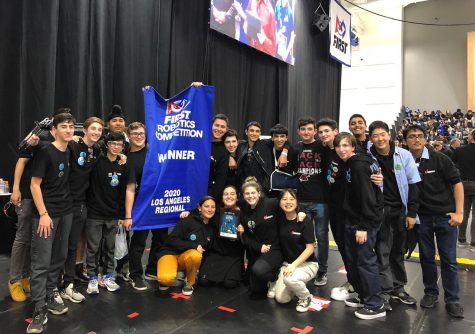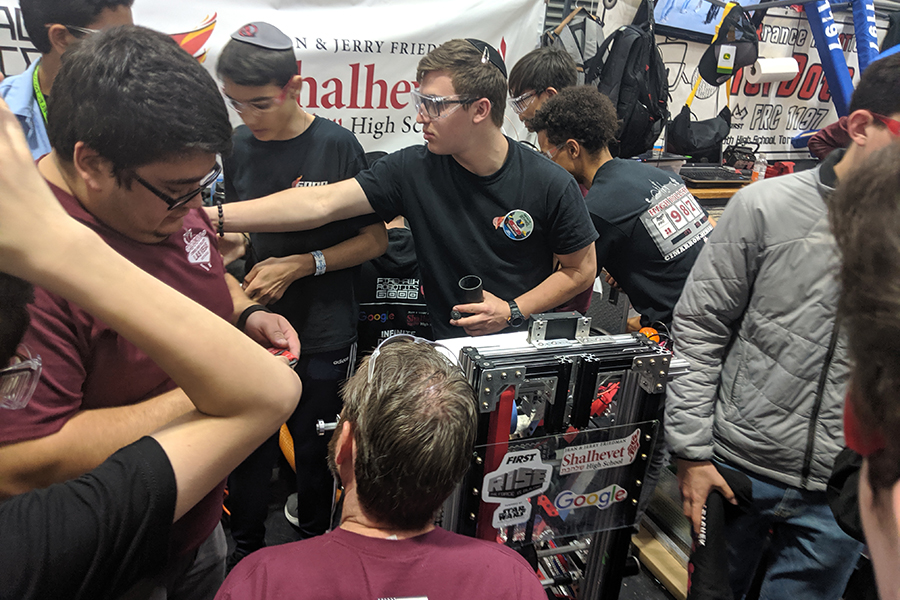Shalhevet’s robot ‘Chaya Leia’ advances to national championship in Houston, but coronavirus cancels the event
After coming in 21st, Firehawks are asked to join the winning alliance
March 27, 2020
As part of a trio with two other teams, the Shalhevet Robotics Team won the Los Angeles Regional “For Inspiration and Recognition of Science and Technology” (FIRST) Robotics competition in El Segundo March 6 – 8, and was headed to a national finals round before further contests were cancelled due to coronavirus.
It was the first time in school history that the team had made it to the final round of the competition.
FIRST contests start with qualifying matches that arrive at eight top teams — in this case, out of 44. Each of the eight then chooses two other teams to join in a tournament “alliance.” Shalhevet was not one of the top qualifiers, but the top-ranked team chose it and the second-ranked team to join its alliance.

PROGRAMMING: Senior Evan Rubel edited the code of Shalhevet’s robot “Chaya Leia,” helped by programmers from Shalhevet’s alliance partners.
The three robots of that alliance defeated the robots of the other alliances at the tournament, and therefore advanced.
“It was shocking,” said team captain Samson Taxon. “We watched the red fireworks, which meant that our alliance won, on the board, and it was just this feeling of ‘oh my God, we actually won,’ and then everyone came down and rushed to the field.”
The Firehawks’ robot was named Chaya Leia — Chaya being a Jewish name meaning life, and Leia after the character in Star Wars, since this year’s meet was sponsored by Disney and FIRST as part of a Star Wars philanthropic initiative.
The competition took place at Da Vinci High School in El Segundo. Most of the competitors were from across Los Angeles, but some were from other states and even other countries, including Chile and France.
Shalhevet has been part of the FIRST international competition since 2016. Each year, a date is announced on the same day for schools around the world. The tournament is six-12 weeks later, and until then each school works on building a robot to compete.
This year the robots had to shoot yellow dodgeballs into various goals with different heights, the highest of which was around eight feet, and also to climb tilting bars.
The Firehawk team worked for six weeks on its robot, meeting three times a week and during any free time right before the competition. Some people stayed after school five days a week.
“Really a lot of grit, hard work, sweat and tears, a lot of dedication from all of our team members,” said Evan Rubel, the team’s head of programming. “It really was a team effort and it was incredible to be a part of it.”

VICTORIOUS: After winning the Los Angeles regional, Firehawks Robotics took a picture with a team from Culver City who had competed for them on Shabbat and helped throughout the competition.
Shalhevet is the only team in all of FIRST that is religiously observant of Shabbat. The first day of the competition was only practice matches, and the qualifying matches were on Saturday, so team 702- “The Bagel Bytes”- from Culver City High School drove Shalhevet’s robot for them.
During Friday’s practice round, Firehawks Robotics encountered some problems.
“Things were going relatively well and then towards the end things started to break and we had to leave everything in the hands of Team 702,” said Samson. “We went off in our Shabbaton in and got all nervous because things weren’t working.”
Mr. Sinajon, the faculty advisor of Shalhevet’s robotics team, gave the team updates during Shabbat. At first they were in 11th place out of 22, which the team was happy about because the top eight teams get to choose their alliances after qualifying. However, once they went back to the competition after Shabbat, they dropped down to 22nd.
That made forming a good alliance critical. According to Samson, an important part of getting good alliances is talking to other teams and being friendly, and because Firehawks Robotics made sure to do that, they were confident that they would get picked in a high alliance after qualifying matches.
Once they went on the field for alliance selection, Samson said every team was getting picked but theirs. However, once the highest ranking team got to pick their alliance at the end, Shalhevet was chosen.
“For some reason we were shockingly picked and I still can’t wrap my head around why they did that,” Samson said. “The number one team picked the number two team, and then they picked us, the number 21 team. We were shocked to be picked and we all freaked out.”
After that, Firehawks robotics and the other teams in its alliance continued to win every match, from quarterfinals, to semifinals, and finally, to finals, where they won the FIRST regional competition overall, out of 44 teams.
“One of the most unforgettable days I’ve ever experienced,” said Mr. Sinajon. “It was something we did not expect at all, it’s a very surprising outcome for us. I’m very very proud. A lot of things had to go right. We had to have a lot of support and help to get there, but it was truly a team effort and we couldn’t be happier.”
The way FIRST works is that there are 183 regionals all over the world, but only two championships — one in Detroit and one in Houston — followed by “Einstein Finals” that determine the winners.
Normally, because Shalhevet won, its alliance would advance to the FIRST championship in Houston. However, because of the coronavirus pandemic, the championship has been cancelled.
In addition to that, most of the regional competitions have been cancelled as well since they had not happened yet prior to the spread of the virus. Around the world, regionals were scheduled to take place over a period of eight weeks, and the Los Angeles regional was in week two, before any of the regionals had been cancelled.
“It’s my first year being in robotics and I was so excited that we made it to the championships,” wrote sophomore Emily Klausner in a text message. “Now that it’s cancelled, I realize how much I want to be on the team next year and how much I want us to win again.”














